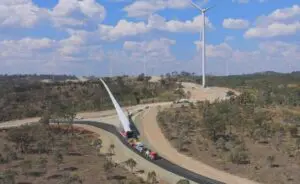AGL has signalled its intent to extend into Australia’s ‘next generation’ alternative transport fuel market, with the announcement of plans to roll out a network of Compressed Natural Gas (CNG) stations across the nation’s east coast.
Compressed natural gas – also know as biogas when it is collected from landfills or wastewater plants – is mostly methane stored at high pressure. It can be used in place of petrol, diesel fuel and LPG, its main advantages being that it produces fewer emissions and is safer in the event of a spill.
In the US, there are 120,000 Natural Gas Vehicles (NGVs) already on the road, with forecasts predicting that 30 per cent of heavy trucks in America will shift to natural gas (both CNG and LNG) by the end of the decade.
AGL’s CNG vision for Australia was unveiled at the International Truck, Trailer and Equipment Show in Melbourne on Thursday, with the energy company’s managing director Michael Fraser pledging to create a viable and competitive fuel offering for the transport industry – the nation’s second most energy intensive.
“A rising proportion of our road transport sector is … fuelled by foreign crude and fuel imports, increasing from 60 percent in 2000 to over 90 percent today,” Fraser said.
“Diversifying our fuel mix and building an alternative fuels industry locally, is part of the solution to developing a more resilient economy. …It is a step which we hope will not only help Australian businesses become more competitive and productive, but also contribute to the nation’s longer term energy security.”
AGL plans to establish its network of “next generation” AGL Smart CNG refuelling stations as a “long-term, viable and widely available fuel for commercial customers.” They will be located in “key geographical areas” – starting with Melbourne, later this year – so that fleets can refuel without having to alter their routes.
Also speaking at the International Truck, Trailer and Equipment Show in Melbourne on Thursday, AGL’s general manager of power development, Scott Thomas, said foreseeable national growth in CNG refuelling infrastructure was contributing to an increase in investment in CNG-compatible vehicles.
“Natural gas transport products provide local transport operators with improved operational benefits, lower operating costs, and a proven and low emission fuel supply,” Thomas said.










